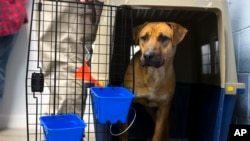ເກົາຫຼີໃຕ້ ຈະຊ່ວຍຫາບ້ານຫຼັງໃໝ່ໃຫ້ໝາເກືອບເຄິ່ງລ້ານໂຕ ທີ່ຖືກລ້ຽງສຳລັບອາຫານ ແລະ ໃຫ້ເງິນຊ່ວຍເຫຼືອພວກເຈົ້າຂອງຟາມລ້ຽງໝາ ແລະ ສິ່ງຈູງໃຈຕ່າງໆເພື່ອຊ່ວຍເຫຼືອເຂົາເຈົ້າກຽມພ້ອມສຳລັບການຫ້າມຕໍ່ການປະຕິບັດດັ່ງກ່າວ ທີ່ມີກຳນົດຈະມີຜົນບັງຄັບໃຊ້ໃນຕົ້ນປີ 2027, ກະຊວງກະສິກຳໄດ້ກ່າວໃນວັນພະຫັດມື້ນີ້.
ໃນເດືອນມັງກອນທີ່ຜ່ານມາ, ສະພາແຫ່ງຊາດໄດ້ຮັບຜ່ານຮ່າງກົດໝາຍສະບັບນຶ່ງເພື່ອຫ້າມກິນ ແລະ ຊາຍຊີ້ນໝາ, ໂດຍເປັນການສິ້ນສຸດປະເພນີເກົ່າຫຼາຍສັດຕະວັດທີ່ເປັນບັນຫາໃນປະເທດ ທີ່ໄດ້ເຫັນການສະໜັບສະໜູນສຳລັບຄວາມສຸກສະບາຍຂອງສັດຫຼາຍຂຶ້ນ ແລະ ຄວາມຢາກກິນມັນເປັນອາຫານໜ້ອຍລົງ.
ທ່ານ ພາກ ບຽມ-ຊູ, ຮອງລັດຖະມົນຕີກະສິກຳ, ໄດ້ກ່າວວ່າລັດຖະບານຈະໃຊ້ເງິນ 75 ລ້ານໂດລາໃນການຈູງໃຈພວກຜູ້ເພາະພັນໝາ, ເຈົ້າຂອງຟາມ ແລະ ຮ້ານອາຫານ ເພື່ອສົ່ງເສີມໃຫ້ເຂົາເຈົ້າປິດທຸລະກິດຂອງເຂົາເຈົ້າ.
ພວກເຈົ້າຂອງຟາມຍັງສາມາດໄດ້ຮັບເງິນເຖິງ 452 ໂດລາສຳລັບໝາໂຕນຶ່ງທີ່ເຂົາເຈົ້າຍອມເສຍສະຫຼະ, ແລະ ບັນດາເຈົ້າໜ້າທີ່ຈະພະຍາຍາມ ແລະ ເຮັດໃຫ້ສັດພວກນີ້ຖືກຮັບເອົາໄປລ້ຽງໃຫ້ຫຼາຍເທົ່າທີ່ຈະຫຼາຍໄດ້, ຫຼື ຍ້າຍໄປຢູ່ເຮືອນໃໝ່ໃນສະຖານທີ່ລ້ຽງຊົ່ວຄາວ, ທ່ານໄດ້ກ່າວຕື່ມ.
ທ່ານ ພາກ ກ່າວວ່າ “ແນວໃດກໍຕາມ ຫຼາຍຄົນແມ່ນເປັນຫ່ວງວ່າໂຕໝາທັງ ຫຼາຍທີ່ຍັງເຫຼືອຢູ່ອາດຈະຖືກຂ້າຕາຍ ຫຼື ຫຼາຍໂຕອາຈະຖືກນຳມາບໍລິໂພກໃນສາມປີຂ້າງໜ້າ, ຂ້າພະເຈົ້າສາມາດເວົ້າໄດ້ຢ່າງແນ່ນອນວ່າ, ນັ້ນບໍ່ແມ່ນແຜນຂອງພວກເຮົາ.”
ການກິນຊີ້ນໝາເຄີຍຖືກພິຈາລະນາດັ່ງກັບວິທີເພື່ອເສີມຄວາມແຂງແກ່ນໃນລະດູຮ້ອນທີ່ຊຸ່ມຂອງ ເກົາຫຼີ, ແຕ່ການປະຕິບັດດັ່ງກ່າວໄດ້ຫຼຸດໜ້ອຍລົງ ໃນຂະນະທີ່ຄົນ ເກົາຫຼີ ຈຳນວນຫຼາຍກວ່າເກົ່າພິຈາລະນາໝາ ດັ່ງກັບສັດລ້ຽງ ແລະ ຍັງຕຳໜິວິຈານວິທີການຂ້າໝາຫຼາຍຂຶ້ນອີກດ້ວຍ.
ອ່ານຂ່າວນີ້ເປັນພາສາອັງກິດ
South Korea will help rehome almost half a million dogs bred for food and give dog farmers subsidies and incentives to help them prepare for a ban on the practice set to take effect in early 2027, the agriculture ministry said on Thursday.
In January, parliament passed a bill to ban the eating and selling of dog meat, ending the controversial centuries-old tradition in a country that has seen growing support for animal welfare and a waning appetite for the food.
Park Beom-su, vice agriculture minister, said the government would spend about 100 billion won ($75 million) on incentives for dog breeders, farmers and restaurants to encourage them to shut their businesses.
Farmers can also get up to 600,000 won ($452) for each dog they surrender, and the authorities will try and get as many of these animals adopted, or rehomed in shelters, he added.
"Although many are concerned the remaining dogs might be euthanized or a lot of them could be processed for consumption over the next three years, I can certainly say, that is not our plan," Park said.
Eating dog meat was once seen as a way to improve stamina in the humid Korean summer, but the practice has become rare as more Koreans consider dogs as pets and as criticism of how the dogs are slaughtered has grown.





ຟໍຣັມສະແດງຄວາມຄິດເຫັນ